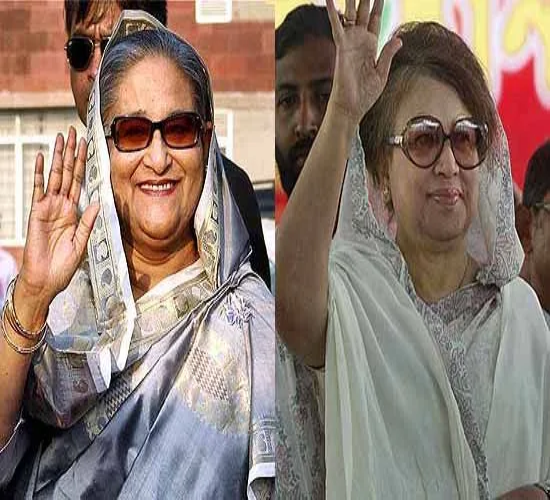Bangladesh is ‘burning’, yet India continues to engage with the Hasina government

By Nava Thakuria*
The ground situation in Bangladesh remains disturbing as the opposition parties continue demanding the resignation of Prime Minister Sheikh Hasina, which she has already rejected outright. The political opponents have threatened to boycott the forthcoming national election due in January next year and pronounced nationwide protest demonstrations and blockades across the south Asian country.
The daylong agitation in Dhaka by the prime opposition, Bangladesh Nationalist Party, on 28 October and subsequent blockades by its political allies protesting the high handedness of the Bangladesh police as well as the ruling Awami League workers has merged with a series of violent incidents killing a number of people and thousands detained. Indeed, our neighbouring country has slipped to the cycle of chaos and violence.
Khaleda Zia led BNP, which boycotted the 2014 general election but reluctantly participated in 2018 polls, vows to boycott the electoral exercise if PM Hasina does not resign paving the way for a neutral caretaker government in Dhaka. The combined opposition parties, including the largest Islamist party Jamaat-e-Islami, claim that Hasina and her party workers will rig the polls in her favour as she is seeking the mandate from nearly 120 million Bangladeshi voters for her consecutive fourth five-year term in office.
Daughter of Sheikh Mujibur Rahman (who led the 1971 freedom movement against the Islamic Republic of Pakistan), Hasina has already stated that neither she will resign nor the Jatiya Sangsad be dissolved prior to the January election. The determined Awami leader disclosed that an election-time government will function during the polls to run the regular affairs without any major policy decisions.
The election commission has made a public statement that it has no other option except to conduct the election on time as per guidelines of the Bangladesh Constitution. It has revealed that the constitution specifies that the polls for Jatiya Sangsad (with 300 elected members) must be organised within 90 days before the end of its full term. The three-months count for the current Parliament began on 1 November and the 12th national election must be conducted and completed by 29 January.
By now political disturbances in the developing nation have attracted the attention of UN secretary-general Antonio Guterres, who called on all parties in Bangladesh to refrain from violence, any excessive use of force, and arbitrary detention of individuals. The UN office of the high commissioner for human rights echoed similar concerns.
Seven influential countries (namely the United States of America, United Kingdom, Republic of Korea, Canada, Australia, Japan and Norway) issued a joint statement through their diplomatic missions to condemn the ongoing political violence in Bangladesh following confrontations between the workers of BNP and Awami League from time to time.
UN secretary-general called on all parties in Bangladesh to refrain from violence, excessive use of force and arbitrary detention of individuals
Even though Bangladesh is burning with political turmoil, India continues to engage the Hasina government for various bilateral initiatives including the enhancement of rail, bus and waterway services as well as cross-border energy trades. Lately Prime Minister Narendra Modi and his Bangladesh counterpart Hasina virtually inaugurated three major connectivity and energy projects including a cross-border rail link that connects Agartala with Akhaura.
The international rail link will help better connectivity for tourists from both the countries and north-eastern traders to use Chittagong port of Bangladesh in need. Tripura chief minister Manik Saha, who was also present on the occasion, commented that the 12.24 kilometer railway line (5.46 km in India and 6.7 km in Bangladesh) will reduce the distance between Agartala and Kolkata from 1,600 km to 500 km only.
Political observers predict a probable electoral loss for Hasina if the polls are conducted in a free and fair manner. But the BNP (if they finally decide to participate in the election) may not emerge as a winner. In such a situation, the Muslim majority country may go to the hands of military dictators once again.
Moreover, the Islamist elements may grab the opportunity to fulfil their long desire to make Bangladesh an Islamic nation with little hope for its return to a Parliamentary democracy. These all may jeopardise bilateral relationships with Dhaka making significant negative impacts on northeast India.
A matter of concern for the north-eastern region indeed.
Source Link: https://www.counterview.net/2023/11/bangladesh-is-burning-yet-india.html















